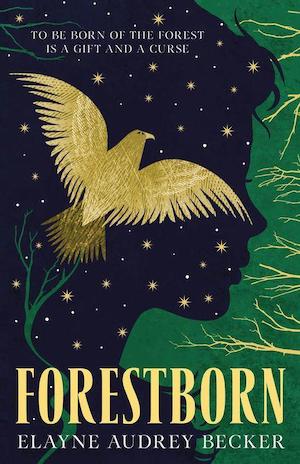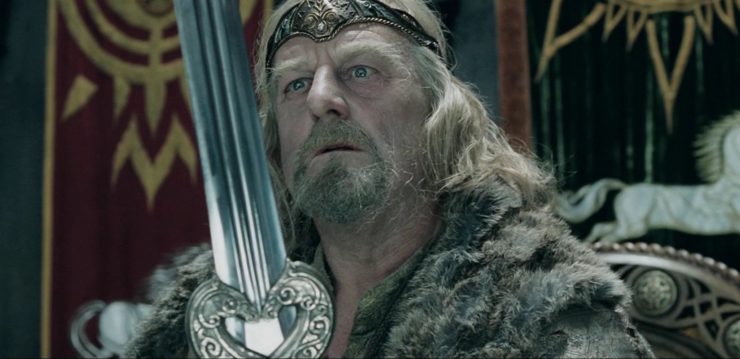When you think of The Lord of the Rings, what comes to mind first? For me, it’s always been the people.
Tolkien’s series abounds with meaningful and memorable characters, one of the many features that have captured readers’ hearts over generations. Really, beyond the journey and the battles and the magic, it’s a story about people—the bonds they share, the losses they suffer, and the lengths to which they’ll go to fight for what they believe.
In the early 2000’s, when Peter Jackson adapted the books for the silver screen, that story reached a whole new audience. Including pre-teen me—I watched The Fellowship of the Ring at my brother’s prompting, stole the untouched books off his shelf and devoured them, and counted down the days until the second and third films were released. (The trailer for The Return of the King remains one of the best movie trailers of all time, and I absolutely will not entertain thoughts to the contrary.)
Between Samwise’s loyalty, Aragorn’s wisdom, and Gandalf’s sharp tongue, it would be easy to believe one of the main characters has the best lines of dialogue in Peter Jackson’s cinematic trilogy, right?
Wrong.
[King Théoden has entered the chat.]
The King of Rohan. Lord of the Riddermark. (Puppet of Saruman that one time he was vaguely possessed, but we don’t need to dwell on that.) In which other character will one find the perfect combination of inspirational regal stoicism and total dad energy?
No other.
He could have given into despair and let his people feed off his pessimism instead of standing tall in the face of evil. He didn’t. He could have left another to lead the charge into battle, could have bowed to the might of the Two Towers without a fight. He did not. When the beacons were lit, he bloody well answered, didn’t he?
Now, credit where credit is due—the words themselves are fantastic, but Bernard Hill is the one who brings them to life. His intonation, his facial expressions—good lord, that man commits, and it is awesome. Yes, I love when Gandalf talks about making the most of the time given to us, and of course, my heart lifts near to bursting when the music swells and Samwise tells Frodo, “I can carry you.” But when all is said and done, Théoden’s scenes in the films have an overwhelming tendency to make my throat pinch tight with emotion and my fist fly into the air.
So that we may all see the light, I’ve compiled my list of Théoden’s top five moments in the movie trilogy. I recommend watching the films as soon as possible to get the lines’ full impact—complete with music, costumes, thundering hooves, the whole works. (Extended editions only, of course.)
All hail, Théoden King.
Théoden: So much death. What can men do against such reckless hate?
Aragorn: Ride out with me. Ride out and meet it.
Sweeping in toward the end of the Battle of Helm’s Deep, this is one of those brilliant sets of lines which transcend time and place; they are just as applicable in a secondary fantasy world as in the real one, hundreds of years ago or today. In the face of hatred, ignorance, and cruelty, what can any of us do but ride out and meet it? Soon enough, Théoden embraces Aragorn’s advice in the most epic way:
Théoden: The horn of Helm Hammerhand shall sound in the deep one last time. Let this be the hour when we draw swords together. Fell deeds awake. Now for wrath, now for ruin, and the red dawn. Forth Èorlingas!
I mean. COME ON. If you are able to reach the end of this rallying cry and not shout Forth Èorlingas! alongside Théoden while pumping your fist in the air, I am sorry to say you possess a heart of stone. These lines and the scene that follows take my breath away every time.
Théoden: They will break upon this fortress like water upon rock… Crops can be resewn, homes rebuilt. Within these walls, we will outlast them.
Aragorn: They do not come to destroy Rohan’s crops or villages, they come to destroy its people—down to the last child.
Théoden: What would you have me do? Look at my men. Their courage hangs by a thread. If this is to be our end, then I would have them make such an end as to be worthy of remembrance.
Before leaving Helm’s Deep, I would be remiss if I did not include this exchange. I love, I love, how Théoden turns this moment on its head. Here we are, accustomed to taking Aragorn’s side and expecting him to be in the right. And yet—in this, he misjudges Théoden. Théoden is no fool, not falsely optimistic or naïve. He is providing the show of strength his people need, choosing to offer a shred of morale instead of despair, even when so little hope remains. It’s a beautiful example of leadership at its best.
Théoden: Take up my seat in the Golden Hall. Long may you defend Edoras if the battle goes ill.
Éowyn: What other duty would you have me do, my lord?
Théoden: Duty? No. I would have you smile again, not grieve for those whose time has come. You shall live to see these days renewed. No more despair.
In my opinion, this is one of Théoden’s most moving scenes in the films. It’s dawn before the Battle of the Pelennor Fields. The sun has just begun to rise, the sky aglow, much as it was the morning Théoden rode out from Helm’s Deep. Here, once more, Théoden stands on the edge of battle, and once more, he does not expect to return.
There’s something beautiful about the quietness of this scene. That amidst the burden of leadership, the current circumstances’ smothering tension, and the near certainty of death to come, he takes time to speak to his niece—not as a king to his heir, but as family. Théoden is so wonderfully human, and this scene showcases that dimension in a new and memorable way.
Aragorn: Gondor calls for aid.
Théoden: And Rohan will answer.
What a brilliantly simple pair of lines to follow the beacons being lit. Not only do they pack a huge punch, eight little words to end a sweeping cinematic sequence spanning grand landscapes and dramatic orchestration, but also—they encompass one of the series’ important questions. Will you follow another’s poor example and sink into past hurts, or will you rise and do better?
Arise, arise, riders of Théoden! Spears shall be shaken, shields shall be splintered! A sword day, a red day, ere the sun rises! Ride now! Ride now! Ride! Ride for ruin and the world’s ending! Death! Death! Death! Forth Èorlingas!
Oh, Théoden. How do you manage to give the most amazing rallying speeches before leading your people into battle? (Yes, I cry for, “It is not this day,” I’m not a heathen—but that is for a separate list, another day.) The Battle of the Pelennor Fields has begun. Théoden is shouting at the top of his lungs, cantering Snowmane down the line and scraping his sword across dozens of spears. You know that incredibly moving moment in the book, when a rooster crows in Minas Tirith just as all seems lost, because morning has come regardless? Rohan’s horns call back, and we’re reminded that hope still remains. For me, this speech and the charge it spurs come close to matching that image’s power. It’s simply perfection.
Buy the Book


Forestborn
Elayne Audrey Becker (she/her) is a storyteller with a passion for history, myth, mountains, and magic. She holds a B.A. from Vassar College and a master of science from the University of Aberdeen, and she has worked as an editor at a New York publisher. Born and raised in Georgia, she grew up with a lake and woods as her backyard, spending long days outside and visiting national parks with her family. Forestborn is her first book.










